McGovern Medical School’s Class of 2024 to meet their matches March 15

One student survived a cancerous brain tumor. Another was called to medicine when a family member suffered a panic attack on an airplane and no doctors were on board. A third worked his way through the military and became an ordained minister before deciding to become a physician in his 40s. These are among the 227 students in the Class of 2024 at McGovern Medical School at UTHealth Houston who will be together on Friday, March 15, to celebrate Match Day, the day when they learn where they will take the next steps in their careers as physicians.
The fourth-year medical students will assemble at Cooley University Life Center to collect and simultaneously open envelopes at 11 a.m. CST. At that time, they, along with thousands of other medical students across the U.S., will discover the residency training programs to which they have been matched. The event is coordinated by the National Resident Matching Program®.
Here are some of the faces of the Class of 2024 who will become the next generation of doctors.
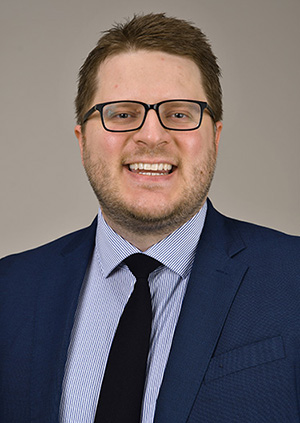
Ethan Damron
Ethan Damron, 30, has wanted to be an oncologist for as long as he can remember.
So, after serving a two-year church mission and graduating from Brigham Young University in 2019 with a degree in biochemistry, he and his wife Kendra moved to Houston so Ethan could begin classes at McGovern Medical School.
However, Ethan started experiencing debilitating headaches during his first semester. In December, he went to see a neurologist. An MRI revealed Ethan had a brain tumor the size of a golf ball.
“I felt like the world was spinning,” Ethan said. “It’s hard to comprehend. I didn’t have any appointments lined up yet, so I’d lay in bed wondering, ‘Is this it? Am I about to die?’ It made me reflect on what I really wanted to do, and I had to evaluate what was important to me.”
Following the diagnosis, Ethan grew even more determined to fulfill his dream of becoming a physician. After taking a year off medical school for his treatment, which included chemotherapy, radiation, and surgery, Ethan returned to complete his first year of school in January 2021, all while finishing his last three cycles of chemotherapy. A couple of months later, he completed treatment, with 99% of his tumor removed.
In the three years since, the father of two young girls said his experience as a patient has been integral to the way he views his future medical career.
“When I was getting treatment, I learned that the difference between a good and great physician isn’t the treatment they provide, but their ability to connect with patients and develop meaningful relationships,” Ethan said. “I try to keep that in mind as I go through the rest of my medical training. When I started shadowing doctors again, I found that I naturally gravitated toward patients who had more serious diagnoses because I could relate to them, especially cancer patients.”
Upon returning to medical school, Ethan wanted to get as involved as possible. Aiming to prepare others for academic success, Ethan served as co-leader of the Medical Education Resource Student Initiative. Through the initiative, he created a digital flashcard deck that he’s shared with incoming students, along with YouTube videos, documents, and other resources to help them study.
He also became involved with research, studying the effects of radiation therapy on multiple myeloma, brain tumors, gastrointestinal cancer, skin cancer, sarcoma, and lymphoma.
With his scans clear and a third daughter on the way, Ethan is optimistic about his future. After residency, he hopes to work at an academic medical center, lead clinical research, and train medical students.
“It’s all I’ve ever wanted to do. I tried investigating other career paths, but nothing fills my cup the same,” Ethan said. “I love science and being a lifelong learner. But what I really enjoy is helping people in such a sincere time of need.”
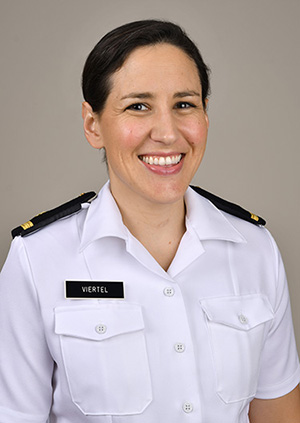
Valentina Viertel
Valentina Viertel’s call to medicine started with an unanswered one. At the age of 10, she vividly recalls sitting on the floor in the back of the plane beside a family member in distress. She felt helpless as her relative lay on the ground, screaming in fear in the midst of a panic attack. The flight attendants repeatedly called for a doctor, but no one came that day.
Now 32, Valentina is poised to become the person who helps those in need. In a few short months, she will start her emergency medicine residency at the Naval Medical Center San Diego in California. Unlike their civilian counterparts, students pursuing careers in military medicine receive their assignments months ahead of time.
“September 11th and the months and years that followed had a major impact on me,” Valentina said. “I knew I wanted to serve our country no matter what.”
After graduating from college, Valentina began working at Johns Hopkins, primarily as an HIV tester and counselor in the emergency department. In what would become six gap years, Valentina got married to her husband, Conrad, and had two children, while also volunteering in lactation counseling and completing a master’s degree in public health.
By the time she began her academic journey at McGovern Medical School in 2020, she was ready to hit the ground running. She served as the president of the Military Medical Student Association, an organization committed to bringing together military medical students in Houston. She was inducted into and then served as the external vice president for the Gold Humanism Honor Society at McGovern Medical School, which recognizes individuals who exemplify humanistic patient care and serve as role models, mentors, and leaders in medicine. She also volunteered with the Moms to Moms Postpartum Education program and a variety of local women’s shelters.
Valentina co-authored a paper with Irene Stafford, MD, associate professor in the Department of Obstetrics, Gynecology, and Reproductive Sciences with McGovern Medical School, which focused on health care disparities among underserved, racial, and ethnic minority groups with cardiovascular complaints during the first postpartum year. The study was published in the Journal of Perinatology.
She found a mentor in Carrie Bakunas, MD, assistant professor in the Department of Emergency Medicine at McGovern Medical School and medical director of emergency services at Memorial Hermann-Texas Medical Center. “She is really a force to be reckoned with and is such an incredible role model for leadership and excellence,” Valentina said. “Dr. Bakunas invested her time in me, pushing me to become a more knowledgeable and competent version of myself for my patients, while also inspiring a love of ultrasound.”
Valentina balanced medical school and motherhood, recently giving birth to her third child, just two weeks after completing her final clinical rotation in critical care medicine. She gives credit to her husband Conrad for helping her get through medical school. “I am so grateful to McGovern for preparing me for the next steps in becoming the best emergency medicine physician I can be for our sailors, Marines, and their families,” she said.
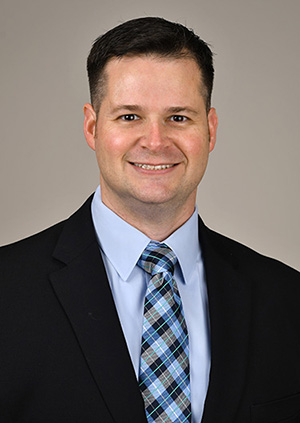
Jerry Roland
A home-grown Conroe boy, former Army Capt. Jerry Roland graduated from West Point, served multiple tours of duty while rising from an infantry platoon leader to company commander, and worked in the oil and gas industry. He also went back to school for a second bachelor’s degree, this one from Sam Houston State University, to prepare for medical school.
Now, at age 41, he is on the brink of adding “physician” to his list of accomplishments.
“Becoming a doctor was at the crossroads of my professional goals and my faith goals,” said Jerry, who has been married for 19 years to wife Erin and has three children ranging from ages 3 to 13. “I felt a call to serve people in a direct and meaningful way, with more connection, and I wanted to do mission work. All of that came together with medicine being the vehicle.”
Jerry started a rural medicine student interest group at McGovern Medical School more than two years ago to increase awareness and interest in rural medicine, noting that all specialties are in short supply in many communities.
He has chosen anesthesiology for a residency.
“When I went through my rotations, I loved everything and wanted to retain my internal medicine knowledge. As an anesthesiologist, you are that internal medicine doctor for the operating room,” Jerry said. “You have the opportunity to practice the full spectrum of medicine while seeing patients from all demographics. For that time when the patient is in the operating room and right after, you are their guardian angel.”
He credits his wife, who found out a week into his first year of medical school that she was pregnant with their third child, for making the journey possible.
“I want to give a shoutout to my wife. Without her, I would not be doing this. She works and holds the fort down so I can do this. God has blessed me tremendously during this journey,” said Jerry, who became an ordained minister during medical school. “Without him, none of this would have been possible.”
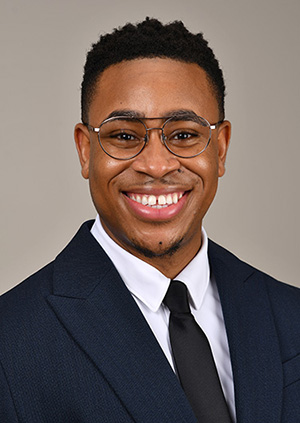
Naahanna Bryan Akahara
When he was 15 years old, Bryan Akahara and his family migrated from Nigeria to Dallas. The transition was difficult, but Bryan had always envisioned himself doing great things despite the challenges he faced.
While growing up in Nigeria, Bryan’s mother’s OB/GYN doubled as their family’s doctor, caring for him and his siblings. He recalls his doctor as a phenomenal person and family friend who made a lasting impression on him.
He had his first experience with health care when he joined his boarding school’s volunteer health team, helping injured and sick students after regular school hours or when the nurse was not available.
“I was spending a lot of time in the clinic and found a genuine desire to help people,” said Bryan, now 24. “It was something that came easily to me.”
After graduating from Dallas College, Bryan went on to major in biology at The University of Texas at Austin. Determined to do well, he found an excellent support system and balanced studying, singing in his a cappella group, and playing his favorite sport, soccer, with friends.
Throughout his third-year rotation, he reflected on his positive experience with his family doctor in Nigeria and found a genuine love for the medical specialty of obstetrics and gynecology.
“Being present for special moments, like the birth of a child, or difficult moments, like the diagnosis of cancer, is something that is very meaningful to me,” Bryan said. “I want to be there for families.”
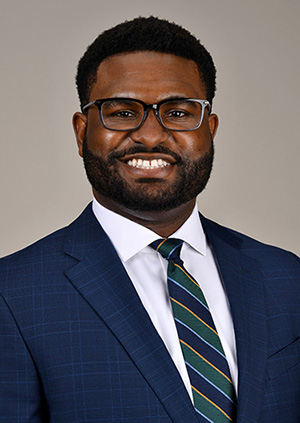
Rosheem Browne
Rosheem Browne, who was born in Brooklyn, New York but raised primarily in the small Caribbean country of Grenada, knew he was interested in studying medicine at a young age. Growing up on an island with a low level of health literacy, Rosheem, 30, saw firsthand the importance of specialized care.
“My mom is a registered dietitian. When I was growing up, she was the only dietitian on the island,” Rosheem said. “When I was younger, I would go with her to health fairs and hear stories of people who were suffering from a lot of chronic diseases—things that could have been controlled, like hypertension and diabetes—but had reached a point where they needed some kind of drastic intervention.”
Rosheem moved to Houston to attend Rice University, where he received a degree in biochemistry and cell biology in 2016. He worked at The University of Texas MD Anderson Cancer Center and volunteered with the American Liver Foundation before earning his master’s degree in medical sciences from The University of North Texas Health Science Center at Fort Worth in 2019.
Rosheem was drawn to McGovern Medical School by its many opportunities, supportive faculty, and overall welcoming culture. He found a mentor in Sara Guzman-Reyes, MD, a professor of anesthesiology who played a critical role in his journey well before he even applied to medical school.
“Dr. Guzman-Reyes has been pivotal in getting me to where I am today,” Rosheem said. “She has helped guide me on what I needed to do next. She helped introduce me to the right people to talk to when I was still trying to figure out what I wanted to go into. Between Dr. Guzman-Reyes and the students, McGovern just felt like it was the right place for me to be.”
During his four years at McGovern Medical School, Rosheem served as his class’s service senator, helping plan fundraisers and their charity gala. He was also a peer mentor during his second and fourth years.
His goal is to become a general surgeon, where he can combine clinical knowledge and technical skill.
“With surgery, it is not just a physical ailment that you’re relieving. From a benign breast mass, to cancer, to a gallbladder, you are removing or repairing something that has probably been an anxiety, a pain, or some source of nervousness in a patient’s life, maybe for months or years,” Rosheem said. “That stood out as something that is incredibly amazing and would be such a privilege to be a part of.”
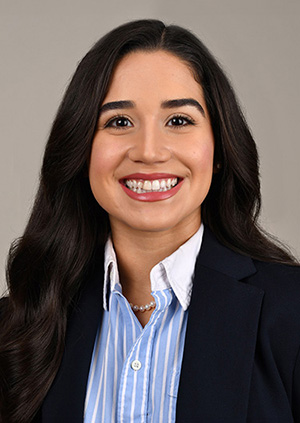
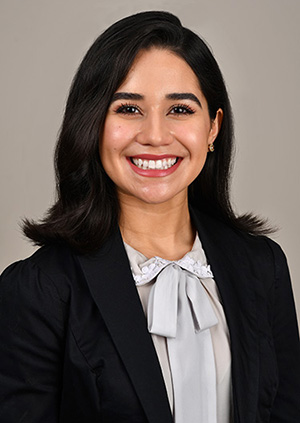
Ellie and Ysa Chapa
Elyse “Ellie” Chapa and identical twin Elysa “Ysa” Chapa, 26, grew up in Harlingen, Texas, surrounded by a close-knit family, volunteering at places like Su Clinica in high school, and earning associate degrees by the time they graduated. They took two gap years, which included both studying abroad in Merida, Mexico, for five weeks.
“We’ve always had similar interests and get along really well,” Ellie said. “The difference is that my sister is more scientific and a logical thinker, and I am more motivated by interactions with people and patients.”
Both are hoping that by participating in the match as a couple, they will spend their residencies at the same place, or at least close by. In the couples’ match, the two candidates will be matched to the most preferred pair of programs on their rank order lists where each partner has been offered a position.
Ellie said it was at Su Clinica in high school that the idea to be a physician first took hold. “Su Clinica sees patients who are underinsured and immigrants,” she said. “I saw a Hispanic female physician. That was my first exposure to self-representation and made me realize it was an option for me. It became something I could see myself doing, and it was a huge turning point.”
Her twin Ysa’s interest in medicine came from her love of science and math and watching her grandfather and mother battle illness. “I thought it would be a great honor to learn how to diagnose and treat patients,” Ysa said.
While in college, the two were volunteers at Haven For Hope, a homeless shelter, and worked as waitresses, medical scribes, and medical technicians at a pain management clinic. Now, their paths will diverge. They have chosen different specialties: neurology for Ellie and oncology for Ysa.
“I’ve always had an interest in neurology because my grandmother was diagnosed with Alzheimer’s disease and had strokes caused by atrial fibrillation,” Ellie said. “I thought the neurology clerkship was so interesting and fascinating. I became involved in the student interest group for neurology. I did a lot of volunteering for organizations like the Houston Area Parkinson Society and learned so much from patients.”
The pivotal person in her decision to choose neurology, Ellie said, was Erin Furr Stimming, MD, professor of neurology at McGovern Medical School, who became a mentor.
As with her twin, Ysa’s career decision was formed in part by watching a female physician treat patients.
“My second year, I was randomly assigned an oncologist as a preceptor. I asked for a female. I got Dr. Jones, and that is where I really fell in love with oncology,” Ysa said. Jessica Jones, MD, is an assistant professor of oncology and a cancer prevention researcher.
“She has an amazing bedside manner. Watching her with patients is so inspiring,” Ysa said. “The trust they put in her — it would be an honor to have them put their trust in me and support them.”
Both Ysa and Ellie credited their mother and older sister, who is a laboratory technician in San Antonio, for supporting them in their quest to become physicians, as well as their grandmother, who recently died.
“They have been a huge support system and have rearranged their goals to support me,” Ysa said. “My mom has sacrificed a lot, working multiple jobs to find better opportunities to support my sister and me as much as she could.”
The sisters also credit each other.
“Originally, we were going to go into the match individually,” Ysa said. “But as the interviews went on and we went through the application process, going to the same city became a priority, so we switched to a couples’ match. Having her with me got me through medical school.”
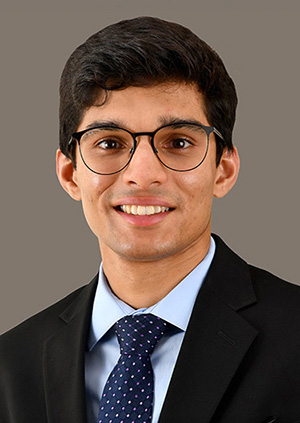
Akshat Kumar
Akshat Kumar, 25, moved to the United States from India when he was 5 years old. Attending first grade, learning English, and adjusting to life in a new country was challenging. But Akshat’s pride for his culture and language never wavered thanks to his mother, who was a great support system.
With a father in electrical engineering and a mother who majored in biology, Akshat was split between pursuing engineering or medicine.
“While I loved the logical reasoning that engineering required, I also loved talking to and connecting with people,” said Akshat, a University of Houston graduate. “When my father helped me realize that medicine requires that same logical reasoning, since the body is essentially a detailed machine, but also involves the ability to connect with people on a deeper level, I made my decision.”
With his inclination towards engineering, Akshat completed two masters’ degrees — one in bioengineering and another in biomedical informatics — during his time in medical school. He hoped to simultaneously develop his creative technical side and his clinical acumen to help create solutions to the problems he would see as a future clinician.
While at McGovern Medical School, Akshat spent significant time at the HOMES Clinic — a local, student-run, no-cost clinic for people experiencing homelessness, where he supported students and clinical staff, won a “Manager of the Year” award for his contributions, and served on the clinic’s board of directors. He chose to apply for a residency in internal medicine because he loves its broad scope and felt it was the specialty where he could form the deepest connections with patients in the shortest time possible.
In the future, Akshat envisions himself working at the intersection of medicine and technology, helping patients through his clinical work and by creating digital tools that help clinicians make better decisions and increase access to medical care.
“I think about my dad’s story and his origins from a small rural town in India where people had to travel for miles to reach health care,” Akshat said. “I hope to use my diverse experiences to help improve care for those populations.”
Media Inquiries: 713-500-3030